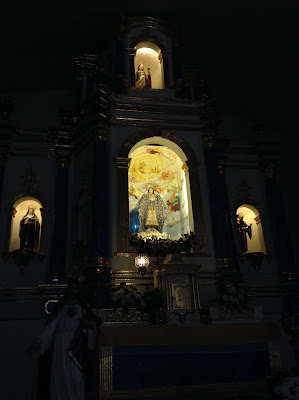Going back to my blog’s main theme which is travelling with
a touch of history, I will now focus on the source of history of almost all the
places here in the Philippines.
It is very common among the churches in the province of
Ilocos Sur and Ilocos Norte, that their belfry is situated apart from the main
church itself. So far the farthest distance that a belfry is situated far from
the church is the sinking bell tower of Laoag.
 |
| The 86- stairway steps |
This church located in the province of Ilocos Sur, is one of the UNESCO World Heritage List of churches here in our country.
 |
| Santa Maria Church's facade |
Baroque style churches were considered special because there are only a few churches here in our country that was designed in that style. Baroque styles among churches are also considered as earthquake baroque.
What makes the church different from the other churches is
that this one is situated atop a hill. One can also see how the locals
preserved the Spanish vibe of the church.
Before Santa Maria church became a parish it served as a
chapel for the church of Narvacan, it was built in the year 1769. The church is
dedicated to the Blessed Virgin Mary under the title of Our Lady of Assumption.
 |
| A mural on the first buttress, that can be seen once you reach the top. The mural is based on how the locals, saw their patron perched on a branch of a guava tree. |
The locals call their patron as “Apo Baket”, and believed to
be miraculous. Locals say that they often saw the Virgin perched on one of the
branches of a guava tree. This guava tree is situated atop the hill where the
church is presently located.
The image face and hands, are made of ivory, and is always wearing embroidered vestments.
The image face and hands, are made of ivory, and is always wearing embroidered vestments.
 |
| Buttresses that supports the church |
 |
| The pagoda- like structure of the church's belfry |
To top it all, the church is simple and beautiful when it
comes to how it represents the culture of the Philippines. For me, this church
is the one that still have the Spanish vibe, from the facade, nave and altar.
 |
| Altar of Santa Maria church |
 |
| Retablo Mayor of Santa Maria church A "pahalikan" is situated at the back of the altar (look at the back drop of the niche of Our Lady of Assumption) |
 |
| Church's pulpit |
 |
| The church's nave |
The location of the church is also suitable for their
patron, which is Our Lady of Assumption, because, it is located atop a hill
overlooking the town, as if saying that the Virgin Mary is the one protecting
the town.
 |
| view from the side of the church |
So, I mainly explained the church of Santa Maria, as for
other details about the town, the other tourists destinations are Pinsal falls,
and beaches that are located among coastal barangays. You may also want to walk
on the old Spanish bridge located in town (which I got to have the chance to walk on to, but
didn’t got to take picture of it). It is built of orange bricks, and can
support ten wheeler trucks and buses. As for food, the province of Ilocos Sur
and Ilocos Norte, is famous for empanada, there are food stalls located at the
foot of the hill wherein you can go eat and taste some of the town’s
delicacies.
 |
| They say it is a pathway that connects the convent to the church, but I don't see any portal at the upper part of the church. Well, this is one of its unique features. |
Well, I’m sorry for focusing too much on the church, because
it really caught my attention on how beautiful it is, and it really deserves to
be in the UNESCO World Heritage List, plus it is a Marian church.
Photos used are all mine.


No comments:
Post a Comment